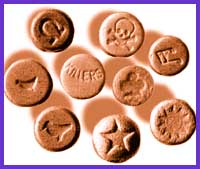Two flyers distributed at a hot nightclub could actually promote experimentation with the new, and potentially dangerous drug, GHB.
The leaflets at Gloucester Street’s Fly, while addressing two very different drugs, deliver relatively the same message.
Facts About Ecstasy offers the simple advice: “Don’t use Ecstasy!
“Caution: May induce inappropriate and unintended emotional-bond imprinting. Remember, Ecstasy is a powerful drug. Treat your body with respect, don’t use it!”
Yet it’s a drug that dozens of partiers have used many times with few ill effects.
Meanwhile the GHB Facts flyer warns: “GHB overdoses are becoming more prevalent” and “one or two deaths are also reported to have been associated with the drug in Toronto.”
The club is being applauded as “responsible” by safer sex educators such as Patrick Evans from the Gay Men’s Education Network.
Others are not so impressed.
“The problem is this information is alarmist,” says Brent Patterson of the Community AIDS Treatment Information Exchange.
“People in the community will roll their eyes – they won’t really read it, even a first time user will have this bored, I’ve-heard-it-before reaction. Any piece that goes out there has to talk about the pleasure. If you can’t talk about that, then you lose your audience.”
Sandy Watters, of the Toronto Raver Info Project, agrees. “Although there are real risks associated with GHB and E, education that uses scare tactics lose credibility. Unbiased harm reduction messages which provide honest discussion about drugs and their use are more effective in keeping drug users healthy.”
To equate the two, with “just say no” messages to a crowd, the majority of whom have experimented successfully with Ecstasy, could cause individuals to downplay the very real dangers of GHB.
While E can cause overdose symptoms similar to drunkenness and can trigger depression days after, it is nowhere near the risk that G poses – with its reported date rape situations, hospitalizations and overdose deaths.
The GHB and Ecstasy pamphlets were prepared by Fly’s assistant manager.
“We decided that perhaps a lot of people didn’t know anything,” says Carmen Dee. “I know some of my own staff had never heard of GHB before. The first set we made, the staff took totally to familiarize themselves because they weren’t aware of these things. A lot of people aren’t.
“All I can say is this is what this drug can do to you. I wouldn’t know how to say to someone how to take something safely. I worry for them,” says Dee. “I’m a 51 year-old-mother, if you know what I’m saying. You tell me what you need from me and I’ll try and help.”
But Dee also says it would be difficult for Fly to distribute information that would condone safer drug use. “It puts us in a difficult situation because of our liquor license. It’s not because I’m not realistic. It’s because it’s the law.”
To find out about AIDS drugs and any nasty interactions with party drugs, call the Community AIDS Treatment Information Exchange at 1-800-2630-1638.

 Why you can trust Xtra
Why you can trust Xtra


